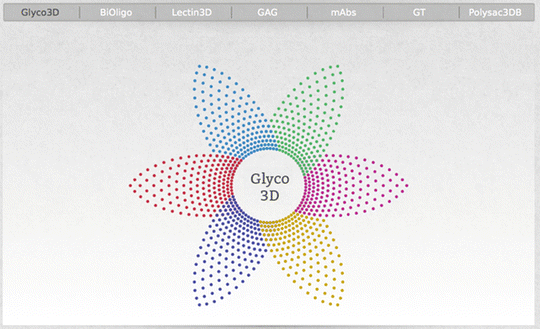Guides
Wayfinders for our collections, tools, and servicesCHEM 143: The Chemical Principles of Life II: Carbohydrates
This guide contains resources to help students learn about biochemistry and to complete class projects.
Glyco3D: A portal for structural glycosciences
 Glyco3D"Glyco3D is a family of databases covering the three-dimensional features of monosaccharides, disaccharides, oligosaccharides, polysaccharides, glycosyltransferases, lectins, monoclonal antibodies against carbohydrates, and glycosaminoglycan-binding proteins. These databases have been developed with non-proprietary software, and they are open freely to the scientific community." (website description)
Glyco3D"Glyco3D is a family of databases covering the three-dimensional features of monosaccharides, disaccharides, oligosaccharides, polysaccharides, glycosyltransferases, lectins, monoclonal antibodies against carbohydrates, and glycosaminoglycan-binding proteins. These databases have been developed with non-proprietary software, and they are open freely to the scientific community." (website description)
Consult major reference works
Comprehensive Glycoscience by J. P. Kamerling (Editor-In-Chief); Y. C. Lee (Editor); A. Suzuki (Editor); N. Taniguchi (Editor); A. G. J. Voragen (Editor); Joseph Barchi (Editor-In-Chief); G. J. Boons (Editor)
ISBN: 9780444519672Publication Date: 2007-07-21Carbohydrates are an important part of life and are present in bacteria, fungi, viruses, yeast, plants, animals and humans. The rapid expansion of chemistry and glycobiology over the last few years has provided many new, imaginative and efficient techniques which provide further insight into the structures and biological interactions of carbohydrates and glycostructures. Comprehensive Glycoscience has a very broad scope and will appeal to a wide audience as it explores the interactions between biology, chemistry and molecular biology towards understanding, synthesising and developing glycoproteins, glycolipids, proteoglyans and polysaccharides, which are important molecules in nature for controlling health and disease and food and feed. Glycocompounds reviewed include: oligosaccharides, polysaccharides, glycoproteins, glycolipids, glycoconjugates, lectins, cellulose, pectins and starch. Topics covered include: spectroscopy, nomenclature, structures, synthesis, biosynthesis, molecular interactions, degradation, biochemistry, glycobiology, glycotherapeutics and diseases. Combines multiple aspects of glycoscience in one comprehensive work Documents the new and rapid expansion of carbohydrate chemistry and glycobiology over the last few years Highlights the many new, imaginative and efficient techniques for providing insights into carbohydrates and glycostructures
Explore books on carbohydrates
Carbohydrate Recognition by Binghe Wang (Editor); Geert-Jan Boons (Editor)
ISBN: 9780470592076Publication Date: 2011-09-06This book contains contributions from interdisciplinary scientists to collectively address the issue of targeting carbohydrate recognition for the development of novel therapeutic and diagnostic agents. The book covers (1) biological problems involving carbohydrate recognition, (2) structural factors mediating carbohydrate recognition, (3) design and synthesis of lectin mimics that recognize carbohydrate ligands with high specificity and affinity, and (4) modulation of biological and pathological processes through carbohydrate recognition.Molecular Nutrition: Carbohydrates by Vinood B. Patel (Editor)
ISBN: 9780128498743Publication Date: 2019-10-16Molecular Nutrition: Carbohydrates presents the nutritional and molecular aspects of carbohydrates. As part of the Molecular Nutrition includes sections covering carbohydrate metabolism, carbohydrates in the diet, insulin resistance, dietary sugars, cardiometabolic risk, lipoproteins, low-carbohydrate diets, antioxidants, refined dietary sugars, fats, glucose transporters, glucose sensing, the role of phosphorylation, carbohydrate responsive binding protein, cyclic AMP, peroxisome proliferator-activated receptors, SIRT1, insulinotropic polypeptide (GIP) and GIP receptor (GIPR) genes rRNA and transcription, and more. In addition, the book addresses emerging fields of molecular biology and presents important discoveries relating to diet and nutritional health. Summarizes molecular nutrition in health as related to carbohydrates Addresses emerging fields of molecular biology and presents important discoveries relating to diet and nutritional health Includes key facts, a mini dictionary of terms and summary points
- Key library links
- Find background information
- Find properties and data
- Learn more about biochemistry
- Molecular visualization tools
- Course projectsToggle Dropdown
Questions?

Amanda Nelson
Chemistry & Chemical Engineering Librarian
Contact:
650-542-1357
Website
Social: LinkedIn Page
- Last Updated: Jul 26, 2024 9:48 AM
- URL: https://guides.library.stanford.edu/chem143
- Print Page